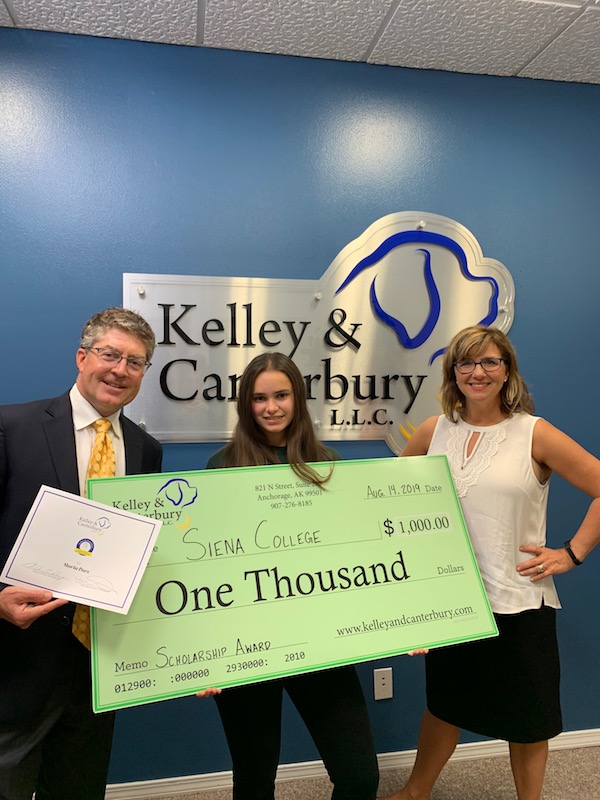
2019 Alaska Curiosity Scholarship Winner
We are excited to announce the winner of this year’s Alaska Curiosity Scholarship: Maria Paez!
Maria’s ardor for problem-solving was immediately apparent in her essay and video. They both discussed Maria’s passion for raising awareness about health inequity in Alaska’s healthcare system.
Join us in congratulating Maria! We are proud to help a young member of the Anchorage community continue her dreams of pursuing an education in medicine.
Here are a few words Maria had to say about receiving the scholarship:
“To me, winning this scholarship means I can focus on my education without having to worry so much about the cost. Receiving this scholarship will enable me to focus on my studies rather than having to work two jobs as a student just to be able to afford college. I chose to attend Siena College because I was admitted to a combined admission program with Albany Medical College. Without scholarships, I wouldn’t be able to afford to attend this combined program. This scholarship makes it so much easier for me to achieve my dream of becoming a doctor and thus be able to serve humanity and help solve the issue of health care inequity. I am incredibly honored to be granted this scholarship!”
Finally, thank you to all our applicants. Please check back to apply again next year.
Watch Maria’s Winning Video Below:
"When it comes to health care inequity, there are two types: inequity of access and inequity of quality. Unfortunately, I’ve had experience with both types. These experiences have truly given me a passion for health equity. This passion is what drives me to dedicate myself to this cause presently as well as throughout my career in the future.
The inequity of healthcare access occurs when individuals lack access to healthcare because of socioeconomic factors. My first experience with this type of inequity was during my trip to Tanzania the summer prior to my senior year of high school. While visiting the FAmE Clinic there, I had the opportunity to speak to the doctor in charge of the women’s health program, Dr. Walli Msuya, since I raised money to purchase equipment to detect and treat cervical cancer for the clinic. Dr. Msuya told me horror stories about women who didn’t have access to healthcare.
While I definitely wanted to help the women in Tanzania, this experience also made me wonder if women in my own Anchorage community didn’t have access to healthcare. This curiosity led me to the Anchorage YWCA, where I volunteered with the Women’s Wellness Program. As a volunteer, I conducted a research project to test the efficacy of mobile mammography vans at connecting low-income Hispanic women with breast cancer screening. I planned a day when the mobile mammography van from Providence Imaging Center would come to Our Lady of Guadalupe Parish, a parish which caters to Anchorages Hispanic population. I administered a survey to the women who received screening to test the efficacy of this event at connecting low-income Hispanic women to screening services. The event proved to be successful. I’m proud that even as a high school student I’ve been able to work to promote equity of healthcare access.
My experience with the inequity of health care quality is far more personal. Two years ago, my father broke his humerus. Because he had Medicaid at the time, the orthopedic physician he visited treated him as if he were less than human, giving him the bare minimum treatment needed to reach the standard of care. A possible cause of this inequity in healthcare quality is the loss of the patient-doctor connection. The connection my grandfather had with his patients is rare in modern medicine.
I know that I can’t solve this issue as a high school student. I can, however, work to solve it as an adult by pursuing a career as a doctor so that I can treat all patients with the decency they deserve. I’m already on track to become a doctor; I’ve been admitted to a combined acceptance program with Siena College and Albany Medical College. I also hope to study sociology in college, so that I could gain insight into how I can promote health equity through systematic change. I can only hope that my genuine passion for health equity will be enough to make a difference for those who suffer from both types of health inequity."